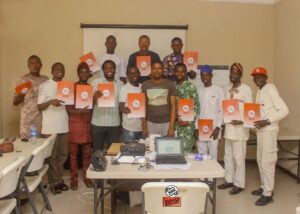N444,600 ($300) monthly minimum wage proposal by Labour Union is not sustainable – Abayomi Odunowo.
The debate over the minimum wage in Nigeria has been ongoing for years, with the labor union consistently pushing for an increase to help workers cope with the rising cost of living. The recent proposal by the labor union to set the minimum wage at $300, which amounts to N444,600 per month at the official exchange rate of N1,482, has sparked a new wave of controversy. While the intention behind the proposal may be noble, it is important to consider the practicality and feasibility of such a significant increase in minimum wage.
It is important to consider the current economic realities in Nigeria before making any drastic changes to the minimum wage. Many of the 36 states in Nigeria are already struggling to meet the current minimum wage of N30,000. With limited resources and a struggling economy, it would be nearly impossible for these states to accommodate a minimum wage increase of such magnitude. Furthermore, the private sector, which is the largest employer in Nigeria, is also facing significant challenges. Many businesses are struggling to stay afloat, and demanding such a high minimum wage could potentially lead to widespread layoffs and closures.
The feasibility and sustainability of any proposal for a minimum wage increase must be carefully considered. While the labor union may argue that workers deserve a living wage, it is crucial to weigh this against the potential impact on the economy. A sudden and significant increase in the minimum wage could lead to inflation, as businesses would likely pass on the increased labor costs to consumers. This, in turn, could worsen the already high cost of living for many Nigerians.
Furthermore, the federal government of Nigeria is currently grappling with significant debt and budgetary challenges. The government is borrowing substantial sums of money to support its budget, and it would be unrealistic to expect it to be able to fund such a significant increase in the minimum wage. It is important to consider the broader implications of any minimum wage proposal and ensure that it does not place undue strain on the government and the economy as a whole.
While the labor union’s proposal for a minimum wage of $300 (N444,600 ) may seem aspirational, it is essential to approach the issue of minimum wage increase with pragmatism. Instead of demanding such a significant increase in one go, it may be more realistic to consider gradual and incremental increases that are more manageable for businesses and the government. This approach would allow for a more sustainable adjustment to the minimum wage without causing undue shock to the economy.
Additionally, it is important to explore other ways to support workers and improve their standard of living. This could include measures such as targeted subsidies for low-income earners, improved social security programs, and initiatives to stimulate economic growth and job creation. By addressing the root causes of poverty and inequality, we can work towards creating a more equitable society without causing undue harm to the economy.
while it is important to advocate for the well-being of workers, the recent proposal by the labor union for a minimum wage of $300 (N444,600) in Nigeria is not realistic given the current economic realities. It is crucial to consider the feasibility and sustainability of any minimum wage increase and to approach the issue with pragmatism. By exploring gradual and manageable increases, as well as other support mechanisms for workers, we can work towards improving the lives of Nigerian workers without jeopardizing the economy as a whole.
I think the labour union thinks this is a joking matter that they will just call figures, so as to dance to the gallery and score a cheap point with the masses, but we all need to think well and deep to help solve the problem we are currently facing in Nigeria.
The current economic situation in Nigeria is dire, with the value of the Naira plummeting and the cost of living skyrocketing. This has put a huge strain on the hardworking people of Nigeria, many of whom are struggling to make ends meet. The labour union has been pushing for an increase in salaries as a way to help alleviate the financial burden on the people, but I believe this is a short-sighted approach that will only exacerbate the problem.
Increasing salaries will only serve to further devalue our currency and create more inflation. This will only serve to make the cost of living even higher, as prices for goods and services will continue to rise. In addition, it will do nothing to address the root causes of the economic crisis in Nigeria. Instead, we need to think outside the box and come up with a more sustainable solution that will benefit all Nigerians.
One of the ways we can help alleviate the financial burden on the people is by ensuring that their purchasing power is increased. This can be achieved by bringing down the cost of essential goods such as food and housing. For example, the price of a bag of Gari should be reduced to N10,000, while a bag of rice should be sold for N15,000. This will help to make these staple foods more affordable for the average Nigerian, allowing them to stretch their hard-earned money further.
In addition, we need to address the issue of housing and transportation costs, which are becoming increasingly burdensome for many Nigerians. By providing drastically cheaper alternatives for housing and transportation, we can help to alleviate the financial strain on the people. This could include initiatives such as affordable housing schemes and subsidies for public transportation.
It is also important to recognize that the current economic crisis is not just a problem for the people of Nigeria, but for the country as a whole. The devaluation of the Naira and the high inflation rate are having a devastating impact on the economy, and if left unchecked, could have long-term consequences for the country. Therefore, it is crucial that we take a holistic approach to addressing these issues, and not just focus on short-term fixes.
One of the ways we can do this is by working to ensure that the economic policies put in place are sustainable and beneficial for all Nigerians. This means taking into account the impact of these policies on the value of the Naira, inflation rates, and the overall economy. It also means working to address the root causes of the economic crisis, such as corruption and mismanagement of resources, which have contributed to the current situation.
The current economic crisis in Nigeria is a serious issue that requires a thoughtful and sustainable approach to address. While the labour union’s call for an increase in salaries may seem like a quick fix, it is ultimately short-sighted and will only serve to exacerbate the problem. Instead, we need to think outside the box and come up with solutions that will benefit all Nigerians, such as bringing down the cost of essential goods and providing cheaper alternatives for housing and transportation. By taking a holistic approach to addressing the economic crisis, we can help to ensure a brighter future for Nigeria and its people.
Labour unions play a critical role in advocating for the rights and welfare of the working class. Their proposals and initiatives often aim to address the economic and social challenges faced by their members. If I were to assume the perspective of a labour union, I would propose setting up four local factories in each local government area. This move would significantly contribute to creating a total of 3,096 manufacturing concerns, effectively reducing the need for importing fuel and manufacturing of broadcasting equipment, which currently account for a significant portion of the country’s import expenses.
The proposal to establish local factories is rooted in the idea of promoting domestic production and self-sufficiency. By harnessing local resources and labor, the manufacturing sector can be revitalized, creating job opportunities and stimulating economic growth at the grassroots level. Additionally, the establishment of these factories would reduce the country’s reliance on imported goods, leading to a more sustainable and resilient economy.
With regards to the fuel industry, the proposal to manufacture petrol and diesel locally represents a significant step towards energy independence. By producing our own fuel, we can decrease the country’s vulnerability to fluctuations in global oil prices and supply disruptions. This would have a direct impact on reducing import expenditures and conserving foreign exchange reserves, which could then be channeled towards other critical sectors of the economy.
Furthermore, the plan to build low-cost housing in all local government areas under an owner-occupier model is a crucial component of the proposal. Housing is a fundamental human need, and the lack of affordable housing options is a significant challenge faced by many working-class individuals and families. By providing access to low-cost housing, the labor union’s proposal aims to address this pressing issue, improving the living conditions and overall well-being of the workforce.
In addition, the introduction of free education and medical services is a transformative initiative that directly impacts the financial well-being of the working class. Education and healthcare are essential services that should be accessible to all, regardless of socioeconomic status. By providing these services free of charge, the proposal seeks to alleviate the financial burden on working-class families, ensuring that they have access to quality education and medical care without the fear of exorbitant expenses.
The focus on addressing the basic needs of food, shelter, and transportation is a strategic approach to improving the overall quality of life for the working class. By ensuring access to affordable housing, education, and healthcare, as well as tackling the manufacturing and energy sectors, the labor union’s proposal would have addressed the core economic and social challenges faced by its members.
Finally if the labor union’s could propose setting up local factories, manufacture basic needs locally, build low-cost housing, and provide free education and medical services is a comprehensive and transformative initiative aimed at improving the lives of the working class. By prioritizing domestic production, self-sufficiency, and access to essential services, the proposal seeks to create a more equitable and prosperous society for all. Ultimately, by addressing the immediate needs of the working class, the labor union’s proposal will have the potential to significantly reduce financial stress and enhance the overall well-being of its members.
Otunba Abdulfalil Abayomi Odunowo
National Chairman AATSG
31st January, 2024.





















